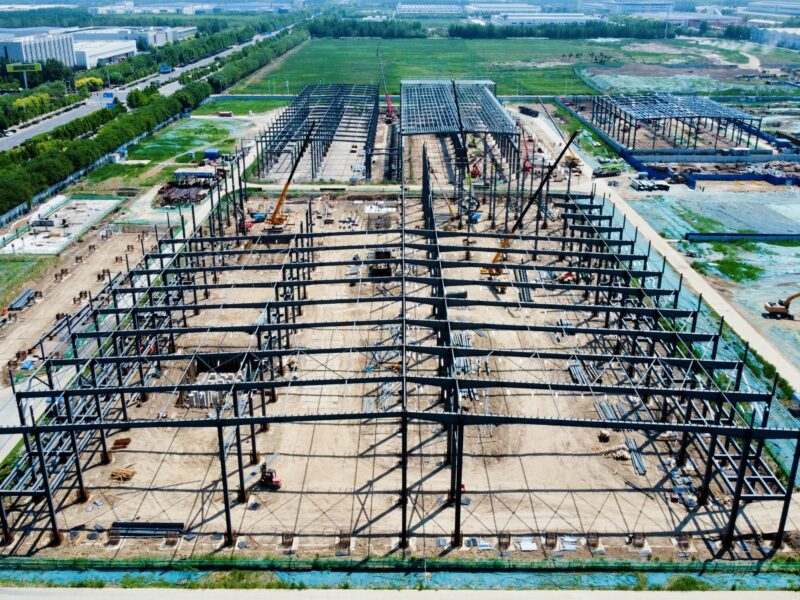
Modular Chicken Houses: Efficient, Climate-Controlled, and Scalable Solutions for Poultry Farming
Modern poultry farming requires precision, efficiency, and sustainability. Traditional chicken houses are often slow to construct, difficult to maintain, and lack the flexibility to adapt to changing flock sizes or climates.
Modular chicken houses are changing the game. Using prefabricated steel frames, insulated panels, and advanced climate-control systems, these houses provide optimal conditions for broilers, layers, or breeder flocks. They allow poultry farmers to scale production, improve animal welfare, and reduce operational costs.
This article explores how modular chicken houses are transforming poultry farming for B2B clients worldwide.
What Are Modular Chicken Houses?
Modular chicken houses are prefabricated buildings made up of factory-manufactured steel frames and insulated wall and roof panels. Each module is designed for quick assembly on-site, ensuring consistent quality and precision.
Their modular design allows farmers to expand capacity by adding new sections as production demands increase. These houses are suitable for all poultry types and can incorporate modern automation systems for feeding, watering, and climate control.
Advantages of Modular Chicken Houses
- Rapid Construction and Deployment
Prefabricated modules can be assembled in weeks rather than months, allowing quicker farm operation. - Optimized Climate Control
Advanced ventilation, heating, and cooling systems maintain ideal temperatures and humidity levels for maximum growth and egg production. - Improved Hygiene and Biosecurity
Smooth, easy-to-clean interior surfaces reduce disease risk and improve flock health. - Scalability and Flexibility
Modular sections can be added or relocated easily to meet changing production requirements. - Durable and Low Maintenance
Galvanized steel frames resist corrosion, moisture, and pests, ensuring long-term reliability. - Energy Efficiency
Insulated panels and automated climate systems lower energy consumption and operational costs.
Design Considerations for Poultry Farms
When planning a modular chicken house, B2B clients should consider:
- Ventilation Systems: Natural or mechanical ventilation for consistent airflow.
- Lighting: LED systems and programmable light schedules to enhance growth and egg production.
- Flooring and Bedding: Materials that ensure animal comfort and easy cleaning.
- Automation Integration: Feeding, watering, and environmental monitoring systems for labor efficiency.
- Biosecurity Layout: Design to minimize disease spread with controlled access points.
Applications Across Poultry Production
Modular chicken houses are versatile and can be used for:
- Broiler Production: Efficient, climate-controlled housing for meat chickens.
- Layer Operations: Houses optimized for egg-laying hens with nesting and lighting systems.
- Breeder Flocks: Controlled environments for parent stock.
- Multi-Stage Facilities: Integrated systems combining rearing, production, and storage.
Global Case Studies
- Vietnam Poultry Farm Expansion:
A 40,000-bird broiler farm used modular houses to reduce construction time by 50% while improving ventilation and hygiene. - Middle East Egg Farm:
Modular layer houses with automated climate control and feeders increased egg production by 20%. - Africa Cooperative Farm:
Prefabricated houses enabled rapid expansion in remote areas with easy transport and on-site assembly.
Why B2B Clients Prefer Modular Chicken Houses
For investors, distributors, and poultry farm operators, modular chicken houses provide:
- Fast ROI due to shorter construction time
- Improved flock health and productivity
- Reduced maintenance and operational costs
- Scalable and flexible farm expansion
- Compliance with biosecurity and hygiene standards
- Energy-efficient and sustainable operation
These features make modular chicken houses an ideal solution for modern poultry operations seeking efficiency and reliability.
Conclusion
Modular chicken houses are transforming the poultry industry by providing efficient, climate-controlled, and scalable housing solutions. They improve productivity, animal welfare, and operational efficiency, making them a top choice for B2B clients and poultry investors.
Investing in modular poultry housing means faster setup, better hygiene, and long-term operational savings — a strategic advantage in the competitive poultry market.
